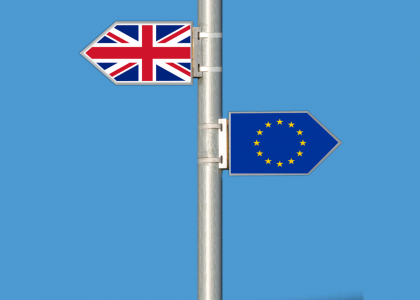On Thursday 23 May, the UK participated in European Parliament elections. Citizens of all EU countries should be able to vote in these elections in the country they live, but many non-UK EU citizens found they had been excluded from the electoral register and were unable to vote. Toby James explains how the government’s long-term failure to improve our electoral laws and short-term pressures led to many people being denied their right to vote.

Photo by Oliver Cole on Unsplash
Britain isn’t known for having Jim Crow election laws like those of the United States – where voter suppression and exclusion has been a prominent feature of America’s political history. The right to vote was formally extended across the US in the 19th century, but there were many de facto practices that made it much more difficult for some people to vote compared to others, therefore reinforcing segregation. These practices include only adding names to the electoral register during harvest time when agricultural labourers were nowhere near registration offices, restricted polling hours in majority black districts or requiring naturalisation papers to be presented when voting. There is evidence voter suppression continues today.
The European Parliament elections that took place on 23 May, however, saw the UK playing catch up. #DeniedMyVote trended on Twitter, as many people faced problems casting their vote. Many non-British EU citizens found that their names were struck off the register when they arrived at the polling station if they had not signed a UC1 form by 7 May, or it had not been received by their local authority in time. This form declared that they would not be voting in another country in these elections. It was not a requirement for UK citizens, just them. And it wasn’t a problem in the other 27 EU member states holding European elections. This was a specific problem of the UK government’s making that gave unequal access to the ballot box.
How could this happen in 2019?
The focus of anger on the day was often on the poll workers who were the bearers of bad news to EU citizens. But just as with a receptionist in A&E who has to explain the long wait for treatment, it is not the front-line worker where the fault predominantly lies. Instead, we should look much higher up the political system. Although there is a high degree of decentralisation in the UK, with Returning and Electoral Registration Officers responsible for elections within their jurisdictions, their job is to apply the law. Electoral law (for European elections) remains centralised and decided by Parliament. In practice, the buck therefore stops with the government for the problem.
Wilful neglect
The real causes of the #DeniedMyVote were fourfold, and they were all fixable.
Firstly, there is an underlying under-registration problem in the UK. This has been a ‘slow burn’ issue resulting from broader changes in society as we become more mobile and less interested in formal politics. But the situation was made somewhat worse by actions taken by the government in 2014. Individual electoral registration was introduced, which required electors to register individually and provide national insurance numbers and dates of birth. Although there were positive steps made to mitigate any drop-off, such as online registration, registration rates for EU citizens dropped to only 53%. Numbers on the electoral register did subsequently rise, but they never kept pace with population rises. The government also failed to introduce major changes that would improve the situation such as automatic registration.
Secondly, the government did not repeal the requirement for EU citizens to complete additional registration paperwork, after problems occurred in the 2014 European elections. #DeniedMyVote happened before. The Electoral Commission was among many to argue that the current practice of requiring citizens to complete an additional form should be made more streamlined. Rather than moving to a near automatic system of inclusion, as used in other European countries, the problem was ignored.
Thirdly, the government only finally confirmed that there would be an EU election on the same day that EU citizens needed to return the form. As part of the ‘hard ball’ Brexit negotiations with Brussels and Parliament – and grandstanding with the public – Theresa May’s government refused to publicly entertain the possibility that it might be required to hold European Parliament elections. The result was local authorities left in limbo, with the prospect of forking out for elections that might not happen. For the voter, this meant they were given virtually no reminder of the need to complete further paperwork.
Fourthly, back in 2017 the government had said that an online system where all citizens, including EU citizens, could check their registration status was too expensive. It was a key proposal of the Missing Millions report, set out by the All Party Parliamentary Group on Democratic Participation. The government’s eventual response to this proposal, however, was to conclude that the system would require too much work. Instead of being able to check their registration status in advance, many were left to find out on the day.
A perfect storm of exclusion
These four causes meant that chaos in some areas was inevitable. It was no doubt made worse by the fact that electoral services are under-funded across the UK. A report on funding electoral services between 2010 and 2016 showed that they were increasingly over-budget. The costs of running elections rose as a result of individual electoral registration, while online registration encouraged last minute (often duplicate) registrations. This would have placed a further strain on officials in their preparations for the European elections.
The polarised nature of British politics and importance of this election during the uncertainty of Brexit has added to the anger and sense of exclusion. Being told to ‘vote in your own country’ was not the advice of temporary poll workers, going ‘rogue’, but the government’s. As Conservative Party Chair, Brandon Lewis, told the Commons:
Prior to the extension of Article 50, we had already encouraged EU citizens to vote in their home countries in the 2019 European parliamentary elections. We expect that most EU citizens in the UK will have followed previous advice to ensure that they can vote in their member state of citizenship.
Citizens were actively discouraged by the government from voting in an election in which they had a right to participate and express their view on Brexit. Having been formally excluded from the franchise in the 2016 EU referendum, many now faced de facto exclusion. The UK found its Jim Crow election laws after all.
Toby James is Head of Politics and Senior Lecturer at the University of East Anglia, UK





